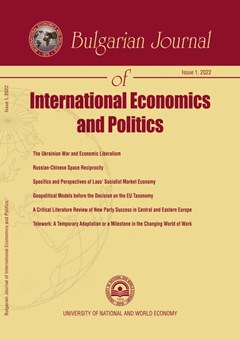Editorial note
Author: Editorial Board
Abstract
EDITORIAL NOTE
With the ongoing war in Ukraine, the political-economic juncture, which stays at the crux of the Bulgarian Journal of International Economics and Politics, becomes increasingly relevant and attracts scientific and research attention. Several of the articles in the current issue reflect the awareness of the repercussions of the current situation on various spheres of international relations.
Thus, the first article investigates the reasons behind the Russian-Ukrainian war from the viewpoint of economic and political liberalism, resuscitating Norman Angel’s arguments from early 20th century about the futility of aggressive war. While addressing other relevant issues within the BJIEP scope, the pieces on Russo-Sino interaction and cooperation in space politics and on the EU policies towards climate neutrality also address the implications of the military conflict in Ukraine within their respective research spheres and position the analysis against the larger background of the current geopolitical and value-laden oppositions in international relations. The article focusing on the Laos economy offers a detailed account of a fairly less known topic and explains the nature of economic relations and their outcomes in this South-Asian country. The fifth contribution presents a critical literature review of the success of party-newcomers in Central and Eastern Europe and attempts to measure the relative weight of various factors in explaining why some new parties endure, while others tend to fade away.
The last piece in the current issue is an invited contribution written by Ivailo Kalfin in his current capacity as the Executive Director of the European Foundation for the Improvement of Living and Working Conditions (2021- to present).[1]Kalfin offers an analysis of a survey on the new phenomenon of teleworking boosted by the Covid-19 pandemic restrictions that has implications reaching far beyond the pandemic and altering the work space and working modes.
[1] Previously Ivailo Kalfin served on two occasions as Bulgaria’s Deputy Prime Minister (2005–2009 and 2014–2016), as well as Minister of Foreign Affairs (2005–2009) and Minister of Labour and Social Policy (2014–2016). Member of the European Parliament (2009-2014), Vice Chair of the Committee on Budgets and rapporteur for the Multiannual Financial Framework 2014–2020.

